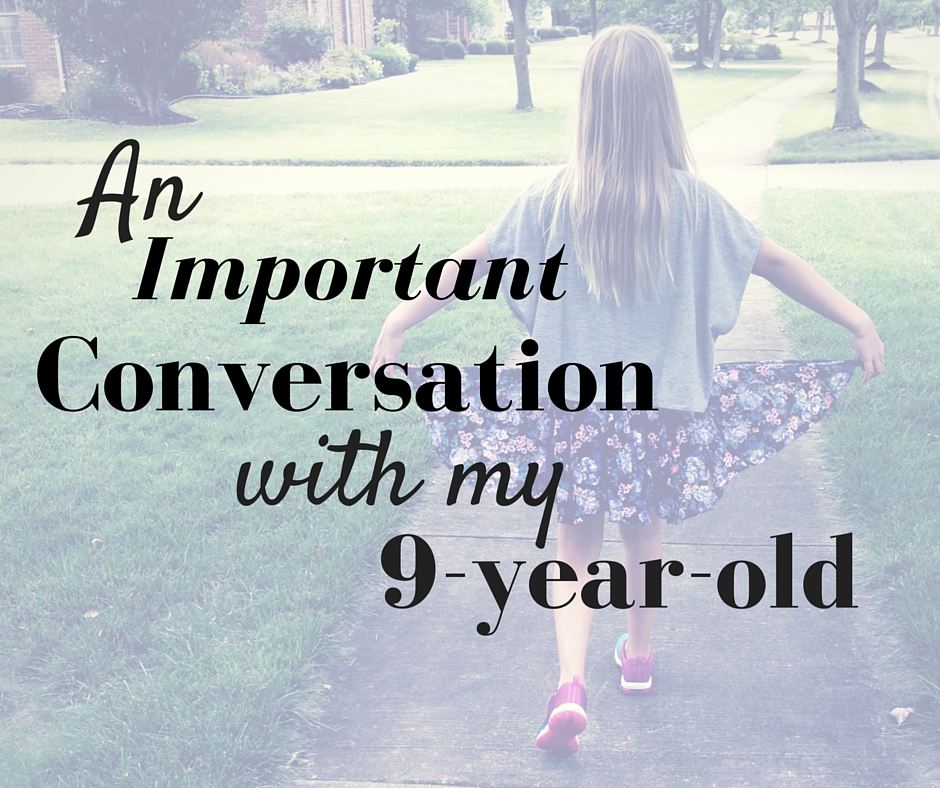
If you follow my Facebook page, there’s a good chance you’re familiar with a little series I call ‘Conversations with my 9-year-old’ (although, in a few months that nine will change to a ten—yikes!). It’s a popular series, mostly because the posts are generally humorous since my daughter has a colorful personality.
A few weeks ago I was driving my daughter home from one of her many after-school activities and she dropped a bomb on me that was bigger than a Facebook post.
J: If a boy hits you or pushes you really hard, then you shouldn’t tell because that just means he really likes you.
M: (mind blank a few seconds as I try to process what she just said)
M: No, sweetie, a boy should never hit you.
Our conversation went deeper, and later that evening I was still trying to process her statement. I’m sure it came from us often telling her the seemingly innocent statement that if a boy teases her it’s just because he likes her. What I realized after this conversation was that her 9-year-old brain couldn’t process the difference between teasing and violence.
My mind started whirling and I wondered if this was how it started. Is this how some women grow up believing they should accept violence in their relationships? That the harder they are hit, the more they are loved?
I’m sure I’m over simplifying things. I mean, I grew up being told that if I was teased by a boy it simply meant he liked me. Yet, as I grew to an adult I also knew that violence was not acceptable in a relationship.
So why did this conversation stress me out so much?
I suppose it’s because my mind wonders what she would have believed had she never made the statement that day in the car. I never thought about talking to her at such a young age about keeping a hard separation between love and abuse. When it came to violence, our conversations were about not pushing other kids when frustrated and using her words rather than her hands. I didn’t think I would have to talk to her about the dangers of abusive relationships until she was ready to start dating.
Guess I was wrong.
Luckily her statement hadn’t been a result of a boy hitting her at school. I think she was just trying to figure out how to tell if a boy really liked her, and she put two and two together based on what she had already been told. We continued to talk, keeping the conversation as age appropriate as possible. But now I’m on alert. I’ll be focused on making sure she knows how to tell the difference between innocent teasing and unacceptable abuse (both physical and verbal). I’ll also make sure she knows how to protect herself if something should happen.
It was a perfect moment to tell her about an incident I had in high school. There was a boy who was poking me in the butt with his pencil as we walked up the stairs. I turned and told him to stop. As I started back up the stairs he started poking my butt again. Sure, it was just a little poke on the butt with a pencil, but it was my body and I hadn’t invited him to touch it in any way. His refusal to act when I told him to stop was inappropriate. I turned and with a bit more force told him to stop or I’d punch him. Well, he didn’t stop so what did I do? I bloodied his lip. I remember his stunned look as he touched his mouth. He never poked my butt again—and neither did his friends.
It’s a good thing I’ve been doing kickboxing for nearly two years. My punches are a lot more solid now, and you can rest assured that I’ve taught my daughter how to punch and kick with purpose!
If you’re a parent, I encourage you to talk to your children about abusive relationships. Don’t wait to talk about it until after they start dating or if you suspect your child is in an abusive relationship. It would be better for them to learn it’s unacceptable before their emotions are clouded by feelings of love. Teach them early that love is not defined by mental or physical abuse and that they shouldn’t accept it or be the one to give it.
~ Carrie





